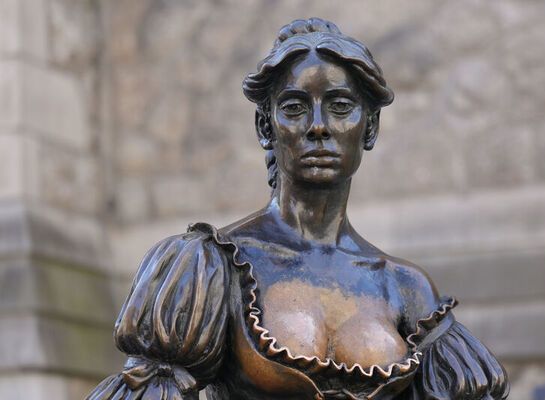By Peter McDermott
Brian Dennehy was asked at his local supermarket in Connecticut last week: "So what's the story: have you retired or what? I never see you anymore."
In fact, the 72-year-old actor is as active as ever. He will appear as Clarence Darrow in "Alleged," an upcoming film treatment of the Scopes trial in 1925, one of five screen credits he's notched up for 2010.
Dennehy also has plans to appear in several theatrical projects over the next few months. He'll spend Christmastime in Dublin, for example, in preparation for the Olympia Theatre's production of John B. Keane's "The Field," which opens in January. And he's due to make a return to the Stratford Shakespeare Festival in Ontario in the spring.
He'll take time out from that busy schedule this coming Monday evening to accept the Eugene O'Neill Lifetime Achievement Award, presented by the Irish-American Artists & Writers.
The Pulitzer-prizewinning novelist William Kennedy was the first recipient last October. The second, though, has a particularly strong connection to the Noble laureate in whose name the award is given.
Dennehy said: "Once you start you doing O'Neill, and you realize how difficult and how complicated and fulfilling at the same time his writing is, you just want to keep working on it. And we have over the years.
"The thing about O'Neill, like Shakespeare, is you can't do it just once, and can't just do it for 30 or 40 performances," he added. "You've got to spend time on it. Not too many people in this country do, but I try to."
Dennehy succeeded the late Jason Robards Jr. as the American actor most closely associated with Eugene O'Neill's work. "We had a very nice relationship," he said. "I was absolutely in awe of him and still am."
Dennehy went one better than the eight-times nominated Robards by winning a Tony, his second, for best lead actor in an O'Neill play, "Long Day's Journey into Night." That was in 2003. An earlier collaboration with the Chicago-based director Robert Falls led in 1999 to a Tony for the Broadway production of Arthur Miller's "Death of a Salesman" and a Laurence Olivier Award for its London production.
For Dennehy, one of the few major stage stars who's instantly recognizable from the screen, it's all about the performance.
"There are a handful of actors for whom acting is an act of self laceration and who leave a piece of themselves out there every night," he said. "I don't envy them and I know how difficult and painful it is for them and I'm not that type of actor."
Dennehy allows "the performance to happen so that the audience understands the character and understands the play. It doesn't get confused with who I am and what I'm going through."
He was born in Bridgeport, Conn., on July 9, 1938, to Hannah and Edward Dennehy. The family's location can be partly attributed to the actor's paternal grandfather who settled in the town, got a job with the Jenkins Valve Co. and never left. He'd grown up in Millstreet, Co. Cork, one of a large family born to a farm laborer.
"He was a very tough, unsentimental man, who understandably, given his childhood, which was very, very poor, had no particular noticeable affection for Ireland or his background in Ireland," the actor recalled of Denis Dennehy. "He was extremely bitter about his childhood in Ireland and the way he had lived.
"He was very glad to be in America, and he had no interest in going back and he had no interest in listening to the music and had no interest in reading the poetry.
"My father, of course, in reaction to that, loved everything connected to Ireland," he said.
Dennehy, who had a home in Ireland for many years, said he could understand both perspectives.
With regard to his relatively unusual career choice, he wasn't in his turn reacting to his father, whose advice was: "Get a secure job with a good corporation and a pension and stay there."
The actor added about the elder Dennehy: "He had very important job for the Associated Press for which he was paid very badly."
His brother followed the advice and became a cop.
"I didn't disagree with them, [though] I lived a completely different life," he said with a laugh. "It wasn't really in rebellion to that attitude at all. I was lucky to find something I wanted to do and I was able to do it. It certainly provided absolutely no security whatsoever.
"In those days, for someone like myself who was not a trained actor, nobody ever really said to themselves, certainly I didn't, 'I'm going to be an actor,'" he recalled. "Driving a truck, or working in a bar, or doing whatever I could to keep body and soul together, if you had any brains, you would never say 'I'm going to be a professional actor.'"
Dennehy discovered his calling in high school but didn't pursue it at Columbia because he had a football scholarship and in those days the jocks and the artists didn't mix.
After a four-year stint in the Marines, he slowly made his way in the profession. He also had a young family to support.
He directed community theater and got parts in off-Broadway and off-off-Broadway productions. One in particular, in a Chekov play, led to a rave review by the New York Times' Mel Gussow.
"My phone started to ring," he said. "That's when I started to realize that it might all work out.
"I think I'm pretty good at what I do. I work very hard at it. I think about it a lot. I think acting is first and foremost a rational, intellectual exercise, not an intuitive one," said Dennehy, who is married to Jennifer Arnot and has a 17-year-old son Cormac and a daughter Sarah, 15, in addition to his three older children. "There is some intuition involved, but I like thinking about it. I like working on it. I like trying to figure it all out."
But Dennehy added: "Anybody who has had the life that I have had for the last 35 years, or whatever it is, has to regard themselves as being extremely lucky and I do. I don't have any illusions about it."
For tickets and information about the IAW&A event, go to http://www.i-am-wa.org.









